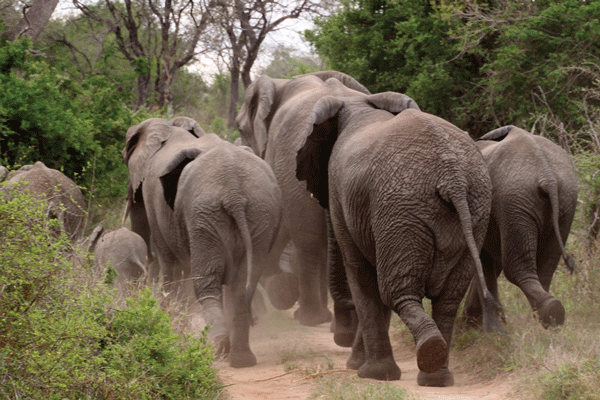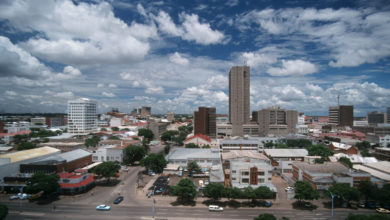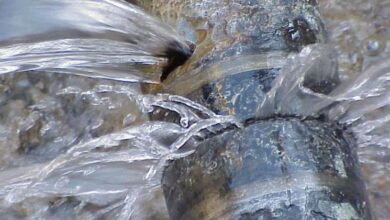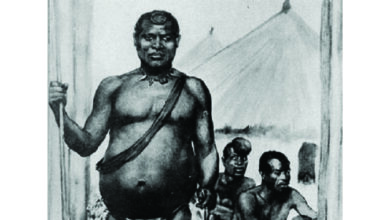Hwange villagers pay heavily as wildlife encroaches into settlements

By Nokuthaba Dlamini
Tymon Sibanda, a village head on the outskirts of Victoria Falls, is between the proverbial rock and a hard place after losing three herds of cattle to lions.
Sibanda from the Chief Mvuthu area said he felt helpless as he often watched a pride of lions devouring his cattle one by one as attacking the predators would have seen him charged for poaching and probably going behind bars for some time.
“Lions and hyenas’ prey on anything including villagers while in our fields, elephants, baboons and birds have almost depleted all our crops this year,” he lamented in an interview with CITE.
“I recently lost three cows to lions that attack our livestock from the kraals at night and even during the day in grazing areas.”
Sibanda said there was very little the villagers could do to protect their livestock against the marauding wild animals such as lions, hyenas, elephants and baboons that stray from surrounding game reserves because they have witnessed many being thrown behind bars for killing the intruding animals.
A snap investigation in communities surrounding game reserves in Hwange district by CITE revealed that many families have been left broken after breadwinners were jailed for killing wild animals in a desperate effort to protect their livestock or crops.
Aggressive coal mining by mainly Chinese owned companies, frequent droughts, lack of funding for conservation efforts and increasing populations has seen more wild animals straying into human settlements, fuelling a human-wildlife conflict.
Given Moyo, councillor from Kachechete ward in Hwange West district said the situation was now dire in his area.
Moyo said he had been forced to move his family into different villages more than once to escape the scourge of stray wild animals.
“We are being troubled by elephants, lions, baboons, birds and hyenas,” he said.
“Villagers find themselves having to always safeguard their crops and livestock because during the day lions scare away herders so that they can attack the cattle, sheep or goats.
“At night the lions follow the livestock to the holding pens where they prey on them.”
Moyo said as if that was not enough, hyenas’ targeted goats and donkeys.
“Hyenas have decimated our donkeys and goats,” he added. “During the farming season, our people end up risking their lives by sleeping in their fields to guard their crops from elephants, baboons and birds.”
A survey revealed that the problem was acute in villages such as Kachechete, Nemanhanga, Chidobe, Matesti and Chikandakubi, among other rural wards in Hwange.
Affected communities are in areas bordering game reserves such as the Hwange National Park, Zambezi Camp, Kazungula and Pandamatenga, among other animal corridors.
Over the years, many rural people including youths have been tried in courts and given varying sentences ranging from community service to statutory mandatory sentences of nine years for killing wild animals even where they were defending themselves and their livestock.
Polygamous Austin Sibanda’s family in Dete is battling to make ends meet after he was jailed in 2019 for possession of ivory.
His senior wife Lungani Thebe said although she acknowledged that her husband had committed an offence, the tough sentence he was given left his family broken.
“We were four of us (wives) living in one homestead and already two have left leaving their children behind, and it is hard for me as the first wife,” Thebe said.
“I am unemployed and all the children have stopped going to school because he was the sole provider and Covid-19 has also made it even more difficult to pay for the children’s education.”
Thebe said Sibanda was lured into poaching by his friends because of hunger and lack of opportunities.
“It was during the peak of drought season and the children had spent several weeks eating baobab roots or dried mushrooms. Since he was unemployed, he gave in to the temptation,“ Thebe said.
“We have not seen him since February 2020 when he was still in Hwange Prison, but he had hinted that they wanted to transfer them so I will only visit him when I get the money.”
Thebe has also lost six goats, one sheep and a cow to lions that stray into their Mabale’s homesteads.
Hwange West Member of Parliament Godfrey Dube said there was a need for the government to invest in conservation programmes, which will cover community awareness campaigns, compensation and realignment of laws.
Dube said Sibanda and Moyo’s cases were now common in communities around his constituency, which is largely rural.
“We frequently get complaints especially during the cropping season due to a higher population of elephants,” the MP told CITE. “We have agreed that the laws need to be amended because they give more protection to the animals than to human beings.”
Zimbabwe Parks and Wildlife Management Authority (Zimparks) spokesperson Tinashe Farawo acknowledged that the communities were bearing the brunt of laws skewed towards animal protection at the expense of human life.
“That (Wildlife Management Act) is a colonial law, which gives animals more rights and dominion over human beings and this is what as an authority are trying to work on reviewing,” Farawo said.
“Consultations will be done and submitted to the government so that we see how best we can balance the issue of human-wildlife conflicts, so they need to compile every loss.”
Farawo, however, said Zimparks was not at law obliged to compensate victims of human-wildlife conflicts.
“We can consider that, but we looked at how Botswana tried to implement it and they lost thousands of pulas, so we wouldn’t want to commit and find ourselves in such a controversial situation,” he added.
Dube suggested that to avoid issues of compensation, the government should invest in wildlife infrastructure.
“The government through the Environment and Tourism ministry should try to resuscitate the systems of fencing and electrifying the fences along the national parks borders and resettlement areas as well as safari farms because that is what has actually increased the conflict as animals will be looking for grazing zones,” Dube said.
“This is an issue that we have brought to the government since 2018. Promises of something being done have not been fulfilled yet people keep dying.
“Some are injured and their livestock and crops destroyed, but they are still charged with wildlife offences when they try to protect themselves.
“Practically, the shooting of problem elephants compared to the damage that they have caused is not justifiable when there has not been any compensation.
“So we will continue emphasising to the government to really understand this at different angles because our communities are struggling and in a deep drought situation.”
Hwange is one of the most food-insecure regions in Zimbabwe.
According to the Zimbabwe Vulnerability Assessment Committee (ZimVac) 2021 Rural Livelihoods Matabeleland Province, the average household cereal stocks in 2021 were 13.4 kilogrammes per household yet the government support in districts such as Hwange covered only a population of 36 percent of those of urgent need of food assistance.
It says reasons for poor harvests were mainly due to poor rain patterns and crops being destroyed by predators such as wild animals and birds.
In Hwange, the Zimvac report also noted that 24 percent of the livestock that died was killed by predators such as lions and hyenas while 20 percent died due to lack of water and drought and the other 49 percent reportedly died due to unknown diseases.
Dube also suggested that the Treasury should set aside at least two percent generated from the district’s vast tourism and environment resources to build infrastructure in Hwange.
“All the money generated through the Zambezi rainforest, hunting, conservation and leisure is taken straight to the national treasury,” the legislator added.
“We have been arguing in Parliament that we must give communities a small percentage that will be used to build clinics, roads and even compensate human-wildlife conflict victims as well as upgrading our conservation efforts.”
Village head Sibanda suggested that the government should also invest in buying solar lights to be mounted in villagers’ kraals to scare away predators at night.





